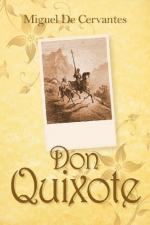|
This section contains 3,406 words (approx. 12 pages at 300 words per page) |

|
SOURCE: Gervin, Mary A. “Don Quixote as Existential Hero.” CLA Journal 32, no. 2 (1987): 178-88.
In the following essay, Gervin explores what she perceives as Don Quixote's disaffection with life and his deluded view of reality in the first part of the novel.
Although Miguel de Cervantes lived and wrote during the period of rebirth and discovery of the Golden Age of Spain, he was doomed by circumstance to be skeptical about the optimistic hopes and dreams of the humanists around him. Having every reason to consider himself an abject failure, Cervantes had had little success at any ventures until Don Quixote was published. Professed by the author to be a parody of the Gilded Age and received by his readers as a satire of the chivalric romances, the novel presents a hero whose beliefs and actions reveal striking similarities to some of the basic tenets of the twentieth-century existentialists...
|
This section contains 3,406 words (approx. 12 pages at 300 words per page) |

|


